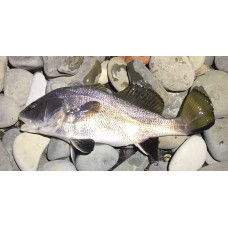Latin name
Sciaena umbra
Other name
Сorb
Identification
The body of the Brown meagre is elongated, tall, with a humped back, somewhat compressed laterally, and covered with small ctenoid scales. The scales on the head, cheeks, and gill covers are cycloid. The snout is blunt and rounded. The mouth is small, inferior, positioned horizontally, and contains small teeth. A chin barbel is absent. The lateral line has 50 scales.
Features of Fish Fins
The dorsal fin is divided by a deep notch into a spiny part (with 10–11 rays) and a soft part (with one spine and 21–24 soft rays). The anal fin has two spines and 6–8 soft rays. The second spine of the anal fin is strong. The caudal fin is rounded or truncate.
Fish Coloration
The back coloration of the Brown meagre is blue with purple and golden hues. The flanks are golden-silvery with a copper tint, and the belly is silvery-white. The edges of the soft part of the dorsal fin and the caudal fin have a black margin. The pelvic and anal fins are black.
Distribution
They are found in the eastern Atlantic Ocean from the English Channel to Mauritania and Senegal, including the Canary Islands; and in the Mediterranean, Black, and Azov Seas.
Habitat
A marine coastal species. It lives at depths from 20 to 180 m over rocky or sandy substrates.
Size
This fish species reaches a length of 70 cm (usually up to 40 cm) and a weight of 4 kg.
Behavior
Brown meagre are more active at night, forming small schools. They are capable of producing sounds using their swim bladder.
Food and Feeding Habits
They feed on small fish (European anchovy, sand smelt) and crustaceans (small crabs, shrimp, amphipods, isopods).
Reproduction
In the Black Sea, they spawn from May to August. Fecundity ranges from 6 to 514 thousand eggs. Spawning occurs in batches. The eggs are pelagic, containing an oil droplet. Larvae are 2.5–2.7 mm long, hatching within the first 24 hours after fertilization. The yolk sac is absorbed four days after the larvae hatch.
Fishing
This fish has minor commercial importance. It is primarily caught in Tunisia and Turkey. Fishing is conducted using gillnets, set seines, and beach seines. It is a popular target for spearfishing.
Relationship with Humans
The dense and tender meat of the Brown meagre has almost no "fishy" smell. Many consider this fish to be the most delicious in the Black Sea.
| Classification | |
| Phylum | Chordata |
| Class | Actinopterygii |
| Squad | Acanthuriformes |
| Family | Sciaenidae |
| Genus | Sciaena |
| Species | S. umbra |
| Features | |
| Conservation status | Near Threatened |
| Habitat | Neritic |
| Life span, years | No information |
| Maximum body weight, kg | 4 |
| Maximum length, cm | 70 |
| Sailing speed, m/s | No information |
| Threat to people | Edible |
| Way of eating | Predator |
Brown meagre
Tags: brown meagre


